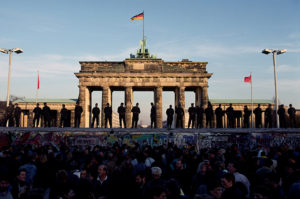By Mike Creswell and Joanna Pinneo
IMB communications
Editor’s note: Thirty years ago, on November 9, 1989, East Germans were allowed to travel to the West, and the Berlin Wall was subsequently dismantled. To commemorate this world-changing event, we’re republishing an excerpt from the Foreign Mission Board’s (now IMB’s) The Commission magazine. The following excerpt was printed in January 1990, two months after East Germans were allowed to travel to the West. We hope this article will inspire you to continue praying for the people of Europe and the peoples of the world who are still behind walls that bar them from hearing the gospel.

Soldiers stand on the Berlin Wall in front of Brandenburg Gate in November 1989 and watch the crowds below. That month, East Germans were allowed to travel to the West for the first time in 28 years. Today, only remnants of the Berlin Wall still stand as a reminder of the past. — IMB photo by Joanna Pinneo
When the Berlin Wall went up in 1961, a barrier 103 miles long and 13 feet high enclosed West Berlin. It cut off some people from jobs, churches, families and friends. Several Baptist churches in West Berlin lost hundreds of members, some half their membership. In East Germany the wall was considered a necessary way to staunch the loss of its people who went West and didn’t return. At least 77 people died trying to cross the barrier.
The middle of West Berlin became one big pedestrian mall in the days after the Berlin Wall opened last November. Hundreds of thousands of East Berliners visited former homes, friends and family, [and] looked and shopped in stores they had only heard about before. At least for a time, there were no barriers of age, background or ideology. Everyone, from old West Berliners to young East Berliners, celebrated just being together.
Challenges open with wall
Western Europe has gasped collectively during recent months as hundreds of thousands of Eastern Europeans have fled West, and as Poland, Hungary, East Germany and Czechoslovakia have turned away from communism’s failed promises to seek futures lit by democracy and other values held dear in the West.
What has happened has been a “reverse domino effect,” with one country after another abandoning communism to try at least a democratic form of socialism.
It was only mid-year that Hungary announced it was opening its border with Austria and began to dismantle a border fence; this led thousands to flee from East Germany. By the end of November, Czechoslovakia had announced it would tear down the fence along its border with Austria.
But on the evening of Nov. 9 the Berlin Wall was opened and about a million East Germans poured into West Berlin to be dazzled by full grocery stores, fresh bananas and liberty’s twinkling neon lights. East Berlin Baptists walked across the border to visit churches in West Berlin they had not seen in 28 years. …
Bill Wagner, a Southern Baptist missionary who lives in Belgium but works throughout Europe, the Middle East and North Africa as evangelism and church growth consultant, traveled in East and West Germany during the weekend the wall opened.
“These people have been living in a 40-year nightmare,” he observed. “They had no way to excuse themselves as a people for the atrocities of the second World War. The separation of East and West Germany was to many of them a simple condemnation by God for their sins of the past. But now there seemed to be a new hope for the future. They were beginning to say, ‘Maybe God has forgiven us, and maybe once again we can become one people and live in peace.’”
Major political changes and continued instability should be expected. Many in Europe, while excited about changes sweeping through Eastern Europe, worry about the accompanying instability. Nowhere is that instability more evident than in the Soviet Union, where nationalistic tendencies have sparked rebellions in outlying republics. Some of the once-called “satellite countries” aligned with Eastern Europe may begin their new lives not as unified countries but as clusters of several cultural-linguistic groups, threatening to fly apart at any moment.
With so many former allies abandoning the Soviet ship of state, can holdouts like Romania and Bulgaria remain afloat?
What does it all mean for Baptists?
For those in West Germany, the next few years inevitably will include turmoil and unparalleled opportunity. The country has been virtually overrun with more than a quarter of a million new settlers from East Germany, many of whom have no religion at all. This factor translates into a major evangelism challenge.
Further, West German Baptists expect around 100,000 Soviet citizens to move to West Germany each year during the next decade. Big evangelism opportunities will abound among these incoming Soviets. …
Meanwhile, many East German Baptist churches — already small in number — have been weakened by the exodus of some members to the West. It’s possible Southern Baptists will need to develop special programs of assistance for East German Baptists, who will need help with training, education and other areas. Missiologists say uprooted peoples are those most likely to be open to spiritual decisions. If so, the new German situation clearly constitutes one of the greatest evangelistic opportunities in 40 years.
NOTE: Mike Creswell was a writer for the Foreign Mission Board (now the International Mission Board), and Joanna Pinneo was a photographer for FMB when the Berlin Wall was opened Nov. 9, 1989. Watch for more stories from the IMB archives as we celebrate our 175th anniversary in 2020. B&R
